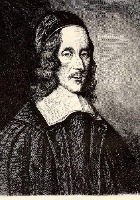Welcome to DU!
The truly grassroots left-of-center political community where regular people, not algorithms, drive the discussions and set the standards.
Join the community:
Create a free account
Support DU (and get rid of ads!):
Become a Star Member
Latest Breaking News
General Discussion
The DU Lounge
All Forums
Issue Forums
Culture Forums
Alliance Forums
Region Forums
Support Forums
Help & Search
Religion
Related: About this forumGeorge Herbert's poetry: Christian calling, struggle and self-doubt
http://www.theguardian.com/commentisfree/2014/mar/17/george-herbert-poetry-faith-vocationOne of the things that is most striking about George Herbert's poetry, taken as a whole, is how unhappy he seems to have been for much of the time. The poems are full of tortured self-doubt, agonised examination of his motivations, and complaint. Usually these are resolved in a neat couplet at the end of the poem, recalling the poet to God's promises or presence, in typical psalmist style. Some of these neat resolutions are more convincing than others.
I suspect that this honesty about the struggles, fears and doubts of life as a Christian is a large part of Herbert's continued appeal as a poet. His doubts and agony about his vocation in life resonate even with many who do not share his faith. For those of us who do, it is refreshing and reassuring to know that we are not alone in finding being a faithful Christian difficult at times. As a member of the clergy, I take great comfort in knowing that even Herbert – the quintessential Anglican Divine – sometimes railed against and agonised about his vocation.
In his recent and very comprehensive biography of Herbert, Music at Midnight, John Drury makes clear just how anguished Herbert was about what he was to do with his life and talents. He had a charmed early life: born into a noble family, Westminster school, Cambridge University. On graduating, he quickly became a fellow and began assisting the university orator. Soon after, he gained the plum job of orator himself. The orator's job was to write speeches and letters on the university's behalf to all sorts of influential people – the King, courtiers, nobles, foreign dignitaries – as occasion arose. It was a key post in the university hierarchy, and a court appointment seemed to beckon. According to his contemporary biographer, Izaak Walton, Herbert at that point hoped eventually to be appointed as secretary of state.
However, Herbert had also always considered being ordained, and greatly enjoyed the academic study of divinity. The pull and tug of these three vocations is on display in several of his poems, particularly the autobiographical Affliction (1), which Drury dates to late in Herbert's time at Cambridge. Eventually, in 1624, he left the university, but it was only in 1630, after six years of soul-searching, that he finally became a country parson.

http://www.poemhunter.com/poem/a-wreath/
A Wreath
A wreathed garland of deserved praise,
Of praise deserved, unto thee I give,
I give to thee, who knowest all my wayes,
My crooked winding wayes, wherein I live,
Wherein I die, not live : for life is straight,
Straight as a line, and ever tends to thee,
To thee, who art more farre above deceit,
Then deceit seems above simplicitie.
Give me simplicitie, that I may live,
So live and like, that I may know thy wayes,
Know them and practise them : then shall I give
For this poore wreath, give thee a crown of praise.
George Herbert
InfoView thread info, including edit history
TrashPut this thread in your Trash Can (My DU » Trash Can)
BookmarkAdd this thread to your Bookmarks (My DU » Bookmarks)
0 replies, 487 views
ShareGet links to this post and/or share on social media
AlertAlert this post for a rule violation
PowersThere are no powers you can use on this post
EditCannot edit other people's posts
ReplyReply to this post
EditCannot edit other people's posts
Rec (2)
ReplyReply to this post